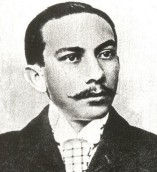- Salvador Toscano
Infobox Person
name = Salvador Toscano Barragán
image_size =150px
caption =Salvador Toscano, c. 1921
birth_date =22 March 1872
birth_place =Guadalajara, Jalisco ,Mexico
known_for = First Mexican filmmaker
death_date =14 April 1947
death_place =Mexico City
occupation = Filmmaker and director, producer, distributor of early Mexican films.
spouse =
parents =Salvador Toscano Barragán (
22 March 1872 ndash14 April 1947 ), also known as Salvador Toscano, was a director, producer and distributor of early Mexican cinema films. cite web|url=http://cinemexicano.mty.itesm.mx/directores/toscano.html|title=Directores del Cine Mexicano: Salvador Toscano|accessdate= 2008-07-17] He wasMexico 's firstfilmmaker . cite web|url=http://www.victorian-cinema.net/toscano.htm|title= Salvador Toscano Barragan - Mexico's first filmmaker|accessdate= 2008-07-16] cite web|url=http://es.encarta.msn.com/encyclopedia_761586874/Cine_mexicano.html|title= Mexican Cinema|accessdate= 2008-07-16] cite web|url=http://listing-index.ebay.com/movies/Cinema_of_Mexico.html|title= Movies - Cinema of Mexico|accessdate= 2008-07-16] Standish, pp. 120-121] Raat, p. 35, "The father of the Mexican film industry was Salvador Toscano Barragán."]Biography
Toscano was born in 1872 in
Guadalajara, Jalisco . He began studying to become a mining engineer, however changed his career to become a filmmaker. He used aCinematograph camera and projector which was first introduced in France in 1895. It was introduced into Mexico a year later when the first presentation of film in Mexico was made onAugust 15 ,1896 .Toscano opened Mexico's first public movie theatre at 17 Jesús María Street in
Mexico City in 1897. [Noble, p. 59] In the public theater he showed such famous early films as " The Great Train Robbery", "A Trip to the Moon ", and "The Kingdom of the Fairies".Toscano began his movie career by filming local scenes in Mexico and local news events. Some early short film titles of these, made in 1896 and 1897, were "Men in Scuffle on the Main Square" and "Rural Police Riding Their Horses."
Toscano began full length production filming in 1898, directing and producing his own movies. They were mostly documentaries pertaining to Mexico. Toscano was the producer of the first full length film in Mexico. It was fiction based on the play "
Don Juan Tenorio ". [Noble, p. 27] The film was made in 1898 starring the Mexican actor Paco Gavilanes. Bethell, p. 521, "The first man in Mexico to make a primitive fiction film was Salvador Toscano Barragan (1872-1941), in 1898, with the first of many film versions of that nineteenth-century romantic staple, "Don Juan Tenorio."]Toscano was a documentary filmmaker mostly however. He filmed on the
Mexican Revolution and most of his movie making was on this subject.Toscano had a rival named Enrique Rosas who also produced films in Mexico at the same time. Many movie theaters had been constructed by 1902 in Mexico City and within a few years many more were spread throughout Mexico. Toscano's last film was shot in 1921.
Toscano's daughter Carmen took many scenes of his Mexican revolutionary documentary films and reintroduced it under the title of "Memorias de un Mexicano" ("Memoirs of a Mexican") in 1950. Noble, p. 58-9 and p. 195] The scenes were filmed by Toscano between 1897 and 1923. Much of the footage was about President
Porfirio Díaz and the revolutionary events of his reign. The reintroduced film was 100 minutes long and premieredAugust 24 ,1950 .One of the propaganda "photo-ops" Toscano made of Díaz was called "General Díaz on a Stroll Through
Chapultepec Park ." Toscano also made documentary films of Díaz's grand celebration of Mexico's first one hundred years of independence.Since 1982 the movie industry of Mexico has awarded the
Salvador Toscano Medal in recognition of outstanding contribution to Mexicancinematography . [Jaszczak, p. 348]References
* Lopez, Ana, "Early Cinema and Modernity in Latin America", Cinema Journal, 40.1 (2000), pp. 48-78.
* Michel, Manuel, "Mexican Cinema: A Panoramic View", Film Quarterly, July 1965, Vol. 18, No. 4, pp. 46–55.
* Herbert, Stephen et al, "Who's Who in Victorian Ciname: A Worldwide Survey", BFI 1996, ISBN 0-8517053-9-1
* Nicholson, Irene, "Mexican Films:Their Past and Their Future", The Quarterly of Film Radio and Television, April 1956, Vol. 10, No. 3, pp. 248–252Notes
Bibliography
* BETHELL, Leslie, "The Cambridge History of Latin America", Cambridge University Press 1995, ISBN 0-5212322-5-2
* CIUK, Pearl. (2000). "Diccionario de directores del cine mexicano ." (2000). Dictionary of directors of Mexican cinema. México: Consejo Nacional para la Cultura y las Artes (CONACULTA) y Cineteca Nacional. Mexico: National Council for Culture and the Arts (Conaculta) and Cineteca Nacional. ISBN 9-7018559-0-6
* DÁVALOS Orozco, Federico (1996). "Albores del cine mexicano ." Davalos Orozco, Federico (1996). Albores of Mexican cinema. ISBN 9-6869324-5-3
* JASZCZAK, Sandra, "Awards, Honors & Prizes: International and Foreign 1996-97", Gale Group 1996, ISBN 0-8103917-5-9
*NOBLE, Andrea, " Mexican national cinema", Routledge 2005, ISBN 0-4152301-0-1
* RAAT, Dirk, "Twentieth-century Mexico", University of Nebraska Press 1986, ISBN 0-8032891-4-6
* RAMÍREZ, Gabriel (1989). "Crónica del cine mudo mexicano . " Ramirez, Gabriel (1989). Chronicle of Mexican silent film. ISBN 9-688054-1-6-X
* REYES, Aurelio de los (1983). "Cine y sociedad en México 1896-1930: vivir de sueños ." Reyes, Aurelio de los (1983). Cinema and society in Mexico 1896-1930: live dreams. Vol. Vol. 1. 1. Universidad Nacional Autonoma de Mexico. ISBN 9-6836312-5-8
*STANDISH, Peter et al, "Culture and customs of Mexico", Greenwood Publishing Group 2004, ISBN 0-3133041-2-2
* VARIOS (1996). "Salvador Toscano: 1872-1947." Pionero del cine nacional. Pioneer of national cinema. México: Comité para la Conmemoración de los Cien Años del Cine Mexicano. Mexico: Committee for the Commemoration of the Hundred Years of Mexican Cinema. Folleto del homenaje a Salvador Toscano con motivo del Centenario del Cine Mexicano. Brochure tribute to Salvador Toscano to mark the centenary of the Mexican Cinema.
* VIÑAS, Moisés (1992). "Índice cronológico del cine mexicano (1896-1992) ." Vine, Moses (1992). Chronological index of Mexican cinema (1896-1992). México: Dirección General de Actividades Cinematográficas de la UNAM. ISBN 9-6836248-7-1
Persondata
NAME = Salvador Toscano Barragan
ALTERNATIVE NAMES = Salvador Toscano
SHORT DESCRIPTION = Filmmaker
DATE OF BIRTH = 1872
PLACE OF BIRTH = Mexico
DATE OF DEATH = 1947
PLACE OF DEATH = Mexico
Wikimedia Foundation. 2010.
